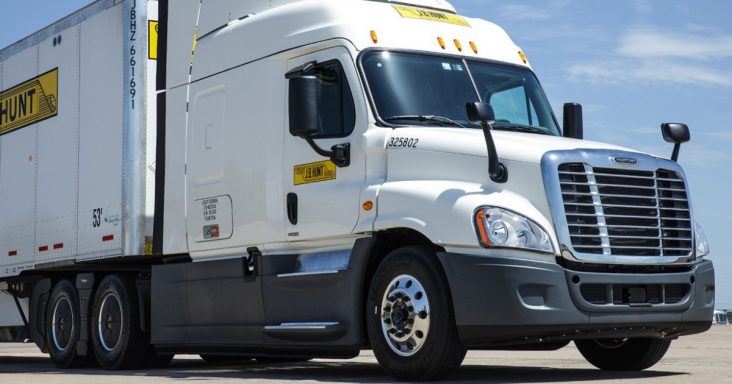J.B. Hunt revenue to rise 5%, earnings to fall 4% in fourth quarter
by January 13, 2021 3:24 pm 1,263 views

Lowell-based carrier J.B. Hunt Transport Services Inc. is expected to post an earnings decline in the fourth quarter and for 2020 as shares rise to a 52-week high following an analyst changing its rating to buy.
After the markets close Tuesday (Jan. 19), J.B. Hunt is expected to report fourth-quarter earnings per share of $1.29, down from $1.35 in the same period in 2019, based on a consensus of 21 analysts. For 2020, earnings per share is projected to fall to $4.58, from $5.21 in 2019.
Fourth-quarter revenue is expected to rise by 4.7% to $2.57 billion, from $2.45 billion. For 2020, revenue is projected to increase by 3.1% to $9.45 billion, from $9.17 billion in 2019.
On Jan. 8, J.B. Hunt shares traded at a 52-week high of $152.69. Shares rose last week after Citi upgraded its stock rating to buy, from neutral, with a 12-month target price of $165. The company expects strong earnings growth from J.B. Hunt over the next few years, according to a Seeking Alpha report.
“We believe we are entering a multi-year growth cycle, most similar to 2012-2015, which could see 80-100% (earnings per share) growth over three years as a solid freight cycle drives its established segments, while its emerging segments swing to profitability and power out-year growth,” the report shows.
J.B. Hunt shares (NASDAQ: JBHT) closed Wednesday (Jan. 13) at $149.22, up 19 cents, or 0.1%. In the past 52-weeks, shares have ranged between $152.69 and $75.29.
In an earnings preview, analysts Justin Long and Jack Atkins and associates George Sellers and Wade Schaller, all of Little Rock-based Stephens Inc., expect J.B. Hunt to meet or slightly beat analyst expectations, and the biggest potential surprise is expected to be from outperformance in the brokerage segment, Integrated Capacity Solutions (ICS).
“But more importantly, we believe the set-up for (J.B. Hunt) into 2021 is attractive as momentum in earnings should improve significantly as the year progresses,” the Stephens analysts said. “We see the three key drivers to this inflection being substantial increases in intermodal pricing (high-single digits or better), growth in the dedicated fleet and a positive inflection in earnings from the ICS segment. Our confidence in all of these items has recently improved, and as we outlined repeatedly last year, we believe the sum-of-the-parts math on (J.B. Hunt) is compelling when valuing the ICS segment at a multiple that is anywhere close to its digital broker competitors.”
The Stephens analysts are encouraged by the potential for earnings per share growth through 2022, “with a meaningful amount of momentum that should build in (the second half of 2021).” They maintained an overweight, or buy, rating and increased the 12-month target price to $167, from $155. They noted this could be conservative if the company’s technology platform, J.B. Hunt 360, is successful, and the market values the company on the sum of its parts. If so, shares could reach more than $180.
Following are the expectations by segment:
INTERMODAL
Intermodal demand continued to exceed capacity in the fourth quarter, and the peak shipping season lasted longer than expected. This likely created service challenges late in the year, but the positive implications for pricing in the 2021 bid season are more important than the short-term service issues, Stephens analysts said. Intermodal price increases are expected in the high-single-digit to low-double-digit for J.B. Hunt. However, the most meaningful financial impact from pricing is expected to come between the second and fourth quarters of 2021.
DEDICATED CONTRACT SERVICES
Third-quarter sales activity in the dedicated segment was strong with 460 trucks sold, and the analysts said they “would not be surprised if there were several hundred additional trucks sold in (the fourth quarter of 2020).” In 2021, they expect sales activity to help the company to meet or exceed its goal of adding between 800 and 1,000 trucks annually. Dedicated margins likely will be under year-over-year pressure “due to the lapping one-time cost cuts from the pandemic in 2020 and higher start-up costs,” the analysts said, adding “we believe the dedicated segment can continue to grow revenue in the high-single digits to low-double digits for an extended period of time with margins that are likely to exceed its 11-13% target as the business builds more scale.”
BROKERAGE (ICS)
The brokerage segment might exceed expectations in the fourth quarter as a result of strength in volumes and a sequential improvement in gross margins. Some of this strength could be attributed to the strong freight demand, but J.B. Hunt 360 “is getting solid traction in the market and building scale very quickly,” the analysts said. The segment’s contract business will be priced again in the upcoming quarters, and “we are feeling incrementally more positive around ICS achieving profitability in (the second half of 2021) or potentially sooner.”
This year is expected to be a “turnaround year” for the brokerage segment, and the Stephens analysts highlighted the research released in multiple notes last year regarding their “sum-of-the-parts math.” They said Uber Freight received an equity investment last fall that valued the company at nearly four times the annual run-rate for revenue. By comparison, if the ICS segment were valued at between twice and four times its revenue, this would equal between $32 and $65 per share of value that the analysts believe is not being priced into the stock price.
